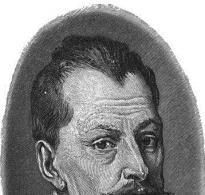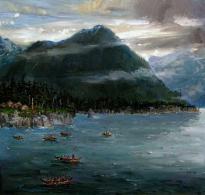How Russian nature is depicted in Yesenin's work. Helping a student. Images of animals and "tree motifs" in Yesenin's lyrics
Pimenov Andrey
Design and research work on literature on the topic "Native nature in the lyrics of Sergei Yesenin".
Download:
Preview:
PROJECT DEFENSE IN LITERATURE.
slide 1
The project I worked on is called "Native Nature in the Lyrics of Sergei Yesenin"
slide 2
The purpose of my project:To understand the attitude of the poet to his native nature on the example of S. Yesenin's poetry.
Tasks:
Study the poet's biography
Pick up poems about nature
Answer the question: How did the poet relate to his native nature?
My project resulted in:
Expressive poetry reading
computer presentation
Why did I choose this topic? Because I like the poetry of S. Yesenin. Also, I love nature.
When I read the poems for the first time, they simply amazed me. It was as if I saw with my own eyes the whole of Russian nature. I also wanted to find and read Yesenin's poems about nature. I found a lot of literature about the poet and his work and prepared this work.
slide 3
Sergei Yesenin was born on September 21, 1895 in an ordinary peasant family and from an early age had a delicate and vulnerable soul and temperament. His mother and father lived in the village of Konstantinov, but he was raised by his maternal grandfather. It was he, being a wealthy and intelligent man who loves books, who taught the still very young Yesenin to love nature and art, which later became one of the main themes of his creative activity.
slide 4
The Russian village, the nature of central Russia, oral folk art, and most importantly, Russian classical literature had a strong influence on the formation of the young poet, directed his natural talent.
Yesenin himself at different times names different sources that fed his work: songs, ditties, fairy tales, spiritual poems, poetry of Pushkin, Lermontov, Koltsov, Nikitin.
slide 5
Many wonderful poems by S. Yesenin are dedicated to native nature. They must be read carefully, trying to understand the main mood, to get used to the rhythm, to the music of the verse, in order to understand how the words form into stanzas..
slide 6
Birch
White birch
under my window
covered with snow,
Exactly silver.
On fluffy branches
snow border
Brushes blossomed
White fringe.
And there is a birch
In sleepy silence
And the snowflakes are burning
In golden fire
A dawn, lazy
Walking around,
Sprinkles branches
new silver
Slide 7
For the first time the poem "Birch" was published in 1914 in the children's magazine "Mirok", although it was written by the author back in 1913. Since then, it has become widely known and loved by the reader. The poem is dedicated to the beautiful birch. It expresses Yesenin's love for the nature of his native land.
Slide 8 (video)
Bird cherry sprinkles with snow,
Greenery in bloom and dew.
In the field, leaning towards shoots,
Rooks are walking in the band.
The silk grasses will vanish,
Smells like resinous pine.
Oh you, meadows and oak forests -
I'm besotted with spring.
Rainbow secret news
Glow in my soul.
I think about the bride
I only sing about her.
Rash you, bird cherry, with snow,
Sing, you birds, in the forest.
Unsteady run across the field
I will spread the color with foam.
Slide 9
“The bird cherry is pouring snow ...” - a poem dated 1910 and related to Yesenin's early landscape lyrics. It reflected the fresh look of the young poet on the beauty of nature. The work is imbued with joy caused by the coming spring - sometimes renewal, rebirth, love. The lyrical hero is drugged by her.
Slide 10
The themes of the motherland and nature in Yesenin's poetry are closely interconnected. The poet cannot be indifferent to its fields, meadows, rivers, while describing nature, the poet thereby describes the homeland, since nature is part of the homeland. Great love for Russia gave Sergei Yesenin the right to say:
I will chant
With the whole being in the poet
sixth of the earth
With a short name "Rus".
When preparing the project, I listened to many poems by Sergei Yesenin performed by famous theater and film artists. I especially liked the poems performed by the artist Sergei Bezrukov. Fascinating poetry reading!
Slide 11 (video)
slide 12
Yesenin's poetry is close and dear to many nations, his poems are heard in different languages.
The merit of the poet is great.
His works touch on topics close to the people.
Yesenin's language is simple and accessible.
Poetry excites the heart, attracts with its originality and poetic beauty.
Yesenin is a lover of life. And he embodies this quality in his poems, reading which you involuntarily begin to look at life from the other side, treat everything easier, learn to love your land,
I'm in love with Yesenin's lyrics!!!
slide 13
While working on the project, I found out:
- The main theme of Sergei Yesenin's lyrics is the theme of nature and the Motherland.
- In his poems, the author speaks with love and tenderness about the nature of our country.
- Reading Yesenin's poems, I realized that nature has a soul, it is alive.
Preview:
To use the preview of presentations, create a Google account (account) and sign in: https://accounts.google.com
Slides captions:
Purpose: To understand the attitude of the poet to his native nature on the example of S. Yesenin's poetry. Tasks: To study the poet's biography To select poems about nature To learn to expressively read poetry Answer the question: How did the poet treat his native nature? Project result: Expressive poetry reading Computer presentation
Sergei Alexandrovich Yesenin Sergei Yesenin was born on September 21, 1895 in an ordinary peasant family and from an early age had a delicate and vulnerable soul and temperament. His mother and father lived in the village of Konstantinov, but he was raised by his maternal grandfather. It was he, being a wealthy and intelligent man who loves books, who taught the still very young Yesenin to love nature and art, which later became one of the main themes of his creative activity.
About the poet The Russian village, the nature of central Russia, oral folk art, and most importantly, Russian classical literature had a strong influence on the formation of the young poet, directed his natural talent. Yesenin himself at different times names different sources that fed his work: songs, ditties, fairy tales, spiritual poems, poetry of Pushkin, Lermontov, Koltsov, Nikitin.
Many wonderful poems by S. Yesenin are dedicated to native nature. They must be read carefully, trying to understand the basic mood, to get used to the rhythm, to the music of the verse, in order to understand how words form into stanzas.
White birch Under my window Covered with snow Like silver. On the fluffy branches With a snowy border, White fringe blossomed tassels. And the birch stands In sleepy silence, And snowflakes burn In golden fire. And the dawn, lazily circling, Sprinkles branches with new silver. Birch
For the first time the poem "Birch" was published in 1914 in the children's magazine "Mirok", although it was written by the author back in 1913. Since then, it has become widely known and loved by the reader. The poem is dedicated to the beautiful birch. It expresses Yesenin's love for the nature of his native land.
“The bird cherry is pouring snow ...” - a poem dated 1910 and related to Yesenin's early landscape lyrics. It reflected the fresh look of the young poet on the beauty of nature. The work is imbued with joy caused by the coming spring - sometimes renewal, rebirth, love. The lyrical hero is drugged by her.
The themes of the motherland and nature in Yesenin's poetry are closely interconnected. The poet cannot be indifferent to its fields, meadows, rivers, while describing nature, the poet thereby describes the homeland, since nature is part of the homeland. Great love for Russia gave Sergei Yesenin the right to say: I will sing with all my being in the poet One sixth part of the earth With the short name "Rus".
Yesenin's poetry is close and dear to many nations, his poems are heard in different languages. The merit of the poet is great. His works touch on topics close to the people. Yesenin's language is simple and accessible. Poetry excites the heart, attracts with its originality and poetic beauty. Yesenin is a lover of life. And he embodies this quality in his poems, reading which you involuntarily begin to look at life from the other side, treat everything easier, learn to love your land. I'm in love with the lyrics of Sergei Yesenin!!!
In the course of working on the project, I found out: The main theme of Sergei Yesenin's lyrics is the theme of nature and the Motherland. In his poems, the author speaks with love and tenderness about the nature of our country. Reading Yesenin's poems, I realized that nature has a soul, it is alive.
Internet resources used: 2. Video: https://youtu.be/8nAzCk1laDI https://my.mail.ru/bk/volodin.52/video/_myvideo/1943.html 1. Photos and pictures http://www .sesenin.ru/# http://900igr.net/kartinki/literatura/Esenin/Sergej-Esenin.htm http://dreempics.com/img/picture/Jul/17/50c6c87dc3dc3402ee657c7aa94e10ef/1.jpg l
The theme of nature runs like a red thread through the work of the great Russian poet Sergei Alexandrovich Yesenin, beloved and revered by many generations of readers. From an early age, his poems penetrate our consciousness, capturing a part of our soul, he seems to enchant with his images, which seem to be alive and extremely memorable.
The poetic language of S.A. Yesenin is very original and original, thanks to his living images, which he uses in his poetic work, the natural world seems to come to life. The theme of nature in Yesenin's work occupies one of the central places, his descriptions of natural phenomena are melodic, filled with ringing motives. Nature for him is an animated being that acts, lives its own life. The grove “dissuaded” the poet, the birch was “covered” with snow, poplars whisper, and willows cry.
The poet also selects epithets that are quite accurate, capable of recreating a rather vivid and lively picture, he does not try to embellish or use lush comparisons that are inappropriate, rather, on the contrary, he seeks to show the simple and uncomplicated beauty of everything that surrounds us. Let the clouds look like cheap chintz, but they float above their native land, even if the grain is not rich in harvest, but they are grown in their native land. S.A. Yesenin teaches us to notice and love the simple things that surround us, noticing the beauty in the most seemingly ordinary things, which some do not even see in everyday bustle.
The poet in his poems unites the world of people, animals, plants, this world personifies one community, interconnected by inextricable ties of spiritual kinship. With incredible warmth and love, the poet and animals describe, entering into a dialogue with them, feeling their lively participation, kindness and incredible tenderness. In his poem "Kachalov's Dog", the poet has a friendly conversation with her on an equal footing, referring to the dog as a true friend and ally, the tone of his conversation is very warm. With Jim, the poet raises serious topics, talks about everything from relationships, love to life in general, trusting the most intimate thoughts to an ordinary dog.
In the creative heritage of Sergei Alexandrovich, one can feel an inseparable unity with nature, he dreams when humanity understands and realizes the fact that people are just an integral part of nature, that you need to live in harmony with the surrounding world, which is charming and needs our participation. Lyrical works by S.A. Yesenin urge us to love and appreciate mother nature, to live in harmony with her, to take care.
The theme of native nature in the lyrics of S. Yesenin
He said that his lyrics live with one big and pure love, love for the motherland. He did not share the concepts of his native land and Russia - for him they were one. He called Rus' "the country of birch calico". He was Sergei Yesenin.
One of the favorite and main themes of S. Yesenin's lyrics is the theme of nature. Images of the Russian land are present in almost all of his works. So, the poem "Goy, you, Rus', my dear ..." tells about the poet's unspeakable love for Russia. Already at the beginning of the work, in the first line, the poet calls her "native", and then creates an image of fabulous and righteous Rus', in which "huts are in the robes of the image", and in churches - "meek Savior", that is, the celebration of the Orthodox Savior.
The concept of the motherland for Yesenin is assembled from many words, among which “people”, “faith” and “nature” are especially significant. How not to admire the tenderness and care with which the images of landscapes close to the heart of the poet are created in this poem. This is a crumpled stitch, that is, a path, a path with trampled grass along which the lyrical hero will run, and the expanse of “green lehs” - that is, where there are “fences”, the edges of a plowed field, field strips. Finally, this is the endless Russian expanse, the "end and edge" of which "cannot be seen."
Special attention deserves artistic and visual means, with the help of which the author managed to create such a poignant image of his native land. These are epithets (“green lehi”, “meek Savior”), and comparisons (“like earrings, girlish laughter will ring out”, “like a pilgrim who comes in”), and metaphors (“huts are in robes of the image”). The author also turns to color painting. A single picture of the native land turns out to be woven from the blue of the sky, correlated by the great lyricist with the entire Russian land, and the greenery of the field expanse, and the gold that shines through in the foliage of poplars anticipating autumn, which “was ringing”, and in the guessed gold of fresh honey, which will be carried in church on honey spas.
This poem once again proves to us that Yesenin's Motherland and nature are inseparable, and he will never renounce his dear land.
The image of native nature can also be found in the famous poem of the poet "Shagane, you are mine, Shagane ...". This work is imbued with admiration with which the poet speaks of his fatherland. Wanting to show the eastern girl Shagane how beautiful his homeland is, the poet finds the most accurate definitions for describing his native land:
Shagane, you are mine, Shagane!
Because I'm from the north
I'm ready to tell you field
About wavy rye in the moonlight.
The poet contrasts oriental landscapes with Russian ones:
No matter how beautiful Shiraz is,
It is no better than Ryazan expanses ...
"Ryazan expanses" is that particle of the immense blue Rus' that gave rise to Yesenin's sense of homeland. After all, it was Konstantinovo, where Sergei Yesenin grew up, that played a huge role in the formation of the poet's work. Ryazan nature is especially dear to the poet's heart. It is the description of the landscapes of the Ryazan province that gives uniqueness to such a masterpiece of Yesenin's lyrics as the poem "I left my dear home ...". The work is filled with exact epithets (“blue Rus'”, “golden frog”), metaphors (“the golden frog moon // Spread out”), comparisons (“Like an apple blossom, gray hair // ... shed”), with the help of which the author creates the image of relatives places.
For Yesenin, "shrine" is not only nature, but also the peasant world, inseparable from the image of his native land. Therefore, the images of his parents appear as if they are part of a landscape dear to the heart: “A three-star birch forest over a pond // Warms an old mother’s sadness ...”, “like an apple blossom, gray hair // Spilled in my father’s beard.”
The hero is sad that he will not return home soon, but, comparing himself with an old maple tree, he hopes that the village will retain its former features and will not lose its patriarchal foundations.
After analyzing only some of Sergei Yesenin's poems, we can conclude that the poet infinitely loved his homeland and his native nature with the purest and most tender love.
9th grade student
MAOU secondary school №7
them. G.K. Zhukov, Armavir
Timoshinova Ekaterina
S.A. Yesenin in all his poems sang of nature. He grew up in places where there were magnificent landscapes, and nature became for him a kind of school of life. He always wrote about rural nature, and he does not have a single poem in which the poet would pay attention to urban landscapes. He wrote about pure and beautiful nature.
Nature in Yesenin's poems is like a separate world in which harmony and peace reign. That's why he liked to spend a lot of time admiring the scenery. This occupation gave him inspiration to write another masterpiece. Yesenin is a real master who knows how to subtly and beautifully convey the feelings experienced by a person at the sight of nature.
Yesenin, like no one else, felt nature, he even tried to depict the sounds of nature in his poems. For example, “winter sings - calls out” or “poplars wither loudly”. Thanks to this, when reading a poem, a landscape appears before your eyes, which Yesenin describes. It is characteristic that the poet used mainly colors such as gold, crimson and blue to describe nature.
Throughout his creative life, Yesenin did not get tired of singing the rural, peasant nature. He wanted to show the people how good Russian nature is. It must be protected and cherished. Not many people can see the beauty of nature, many treat it as something due. But Yesenin knew how to appreciate the gifts of nature, so he did not get tired of singing about his native nature.
PROJECT DEFENSE IN LITERATURE.
slide 1
The project I worked on is called "Native Nature in the Lyrics of Sergei Yesenin"
slide 2
The purpose of my project: To understand the attitude of the poet to his native nature on the example of S. Yesenin's poetry.
Tasks:
Study the poet's biography
Pick up poems about nature
Answer the question: How did the poet relate to his native nature?
My project resulted in:
Expressive poetry reading
computer presentation
Why did I choose this topic? Because I like the poetry of S. Yesenin. Also, I love nature.
When I read the poems for the first time, they simply amazed me. It was as if I saw with my own eyes the whole of Russian nature. I also wanted to find and read Yesenin's poems about nature. I found a lot of literature about the poet and his work and prepared this work.
slide 3
Sergei Yesenin was born on September 21, 1895 in an ordinary peasant family and from an early age had a delicate and vulnerable soul and temperament. His mother and father lived in the village of Konstantinov, but he was raised by his maternal grandfather. It was he, being a wealthy and intelligent man who loves books, who taught the still very young Yesenin to love nature and art, which later became one of the main themes of his creative activity.
slide 4
The Russian village, the nature of central Russia, oral folk art, and most importantly, Russian classical literature had a strong influence on the formation of the young poet, directed his natural talent.
Yesenin himself at different times names different sources that fed his work: songs, ditties, fairy tales, spiritual poems, poetry of Pushkin, Lermontov, Koltsov, Nikitin.
slide 5
Many wonderful poems by S. Yesenin are dedicated to native nature. They must be read carefully, trying to understand the main mood, to get used to the rhythm, to the music of the verse, in order to understand how the words form into stanzas..
slide 6
Birch
White birch
under my window
covered with snow,
Exactly silver.
On fluffy branches
snow border
Brushes blossomed
White fringe.
And there is a birch
In sleepy silence
And the snowflakes are burning
In golden fire
A dawn, lazy
Walking around,
Sprinkles branches
new silver
Slide 7
For the first time the poem "Birch" was published in 1914 in the children's magazine "Mirok", although it was written by the author back in 1913. Since then, it has become widely known and loved by the reader. The poem is dedicated to the beautiful birch. It expresses Yesenin's love for the nature of his native land.
Slide 8 (video)
Bird cherry sprinkles with snow,
Greenery in bloom and dew.
In the field, leaning towards shoots,
Rooks are walking in the band.
The silk grasses will vanish,
Smells like resinous pine.
Oh you, meadows and oak forests -
I'm besotted with spring.
Rainbow secret news
Glow in my soul.
I think about the bride
I only sing about her.
Rash you, bird cherry, with snow,
Sing, you birds, in the forest.
Unsteady run across the field
I will spread the color with foam.
Slide 9
“The bird cherry is pouring snow ...” - a poem dated 1910 and related to Yesenin's early landscape lyrics. It reflected the fresh look of the young poet on the beauty of nature. The work is imbued with joy caused by the coming spring - sometimes renewal, rebirth, love. The lyrical hero is drugged by her.
Slide 10
The themes of the motherland and nature in Yesenin's poetry are closely interconnected. The poet cannot be indifferent to its fields, meadows, rivers, while describing nature, the poet thereby describes the homeland, since nature is part of the homeland. Great love for Russia gave Sergei Yesenin the right to say:
I will chant
With the whole being in the poet
sixth of the earth
With a short name "Rus".
When preparing the project, I listened to many poems by Sergei Yesenin performed by famous theater and film artists. I especially liked the poems performed by the artist Sergei Bezrukov. Fascinating poetry reading!
Slide 11 (video)
slide 12
Yesenin's poetry is close and dear to many nations, his poems are heard in different languages.
The merit of the poet is great.
His works touch on topics close to the people.
Yesenin's language is simple and accessible.
Poetry excites the heart, attracts with its originality and poetic beauty.
Yesenin is a lover of life. And he embodies this quality in his poems, reading which you involuntarily begin to look at life from the other side, treat everything easier, learn to love your land,
I'm in love with Yesenin's lyrics!!!
slide 13
While working on the project, I found out:
The main theme of Sergei Yesenin's lyrics is the theme of nature and the Motherland.
Reading Yesenin's poems, I realized that nature has a soul, it is alive.





